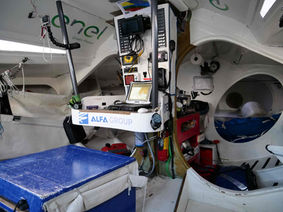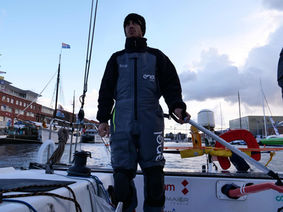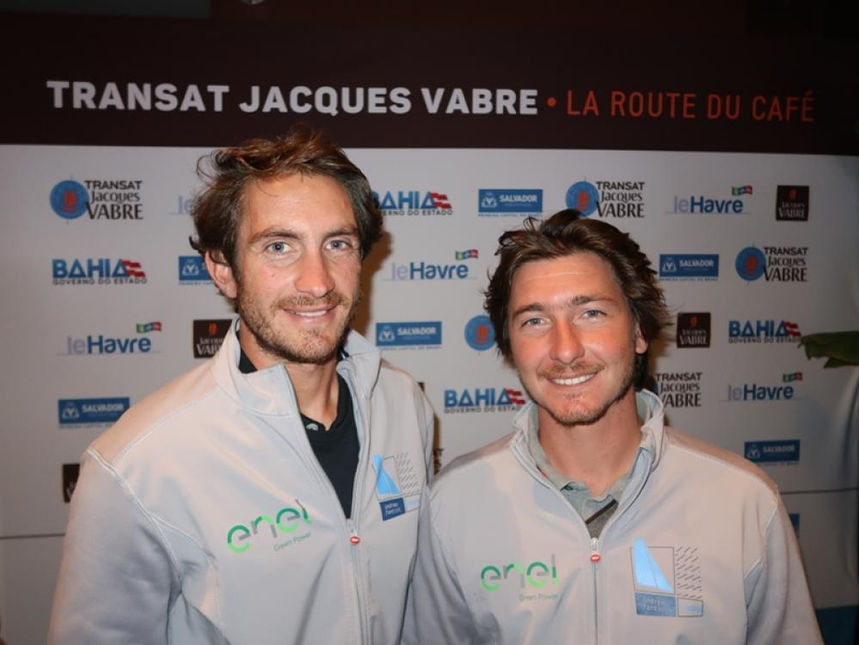For the 2017 TJV edition, the double-handed transatlantic regatta from Le Havre (France) to Salvador de Bahia (Brazil), together aboard with Andrea there is Alberto Bona, an expert navigator from Turin with a very respectable palmares both in offshore crew and solo races, especially in the Mini 650 circuit.
The couple, renamed on social networks #idueoceanici, sail on the Class40 ITA55 Magalé.
Magalé is a boat with a very respectable history: it was designed by Guillaume Verdier for Giovanni Soldini and for this two-year period, skippered and managed by Andrea, it competes under the name of Enel Green Power.
The Official Partners of the project are Alfa Group, a leading player in the field of IT and cybersecurity solutions, the law firm Akran Intellectual Property and Credimi which deals with short-term financing of small and medium-sized enterprises. The Technical Partners are Slam for technical clothing, Ubi Maior Italia for deck hardware, Intermatica for satellite communication systems, Gottifredi Maffioli for ropes and cables, Garmin Marine for the radar system, and on-board electronics and instrumentation
Andrea brings an Italian spirit to a discipline almost dominated by French and British skippers and does so as the ambassador of clean and renewable energies.
During navigation, the boat sends data about energy production and consumption to land in real-time, to define the optimal system configuration and allow technicians to study and apply the most effective and efficient solutions to the energy problem. The ultimate goal is to cross the ocean using renewable energy sources to recharge the onboard batteries and leave no trace of fossil fuels.
The first appointment is on September 20th in Paris with the official presentation of the race, also called La Route du Café as it retraces – backwards - the ancient trade route of the clippers loaded with coffee from Europe to Brazil. This 2017 edition kicks off on November 5th from Le Havre (Normandy) with arrival in Salvador De Bahia, Brazil, for a total of 4.350 miles.
"As in every journey, also in this project each arrival is a new starting point. For me, participating in Jacques Vabre is the culmination of a long journey, made of difficult moments, satisfaction, and made possible also thanks to the enormous work of the team that has gradually consolidated and strengthened. A great reward, therefore, for never giving up and at the same time the beginning of a new adventure that we hope will take us far. I certainly feel the responsibility towards all those who believed in me and in the project: Enel Green Power, all partners, and my team. As always, I will do my best to repay their trust and I am happy to do so with Alberto with whom we are reaching an excellent understanding."
The transoceanic route from North to South is more complex than a simple crossing from East to West. The crews must make tactical choices and make important strategic decisions, have excellent weather knowledge and chart-reading skills, excellent physical conditions to maintain high speed in the trade winds, technical know-how to repair and fix things onboard, and a great deal of patience when crossing the equator.
Crossing the tricky Pot-au-Noir, where an area of low pressure persists formed by the convergence of hot and humid air masses brought by the trade winds, boats pass from the cold of the North Atlantic to the subtropical heat of Brazil. This can create areas of very strong winds but also areas of total calm, the real skippers' nightmare.
Unfortunately, Andrea and Alberto were forced to abandon the race after the collision with an Unidentified Floating Object which broke one of the two rudders and created a hole in the stern part of the hull, giving the crew no other choice but setting sail to Portugal.






















